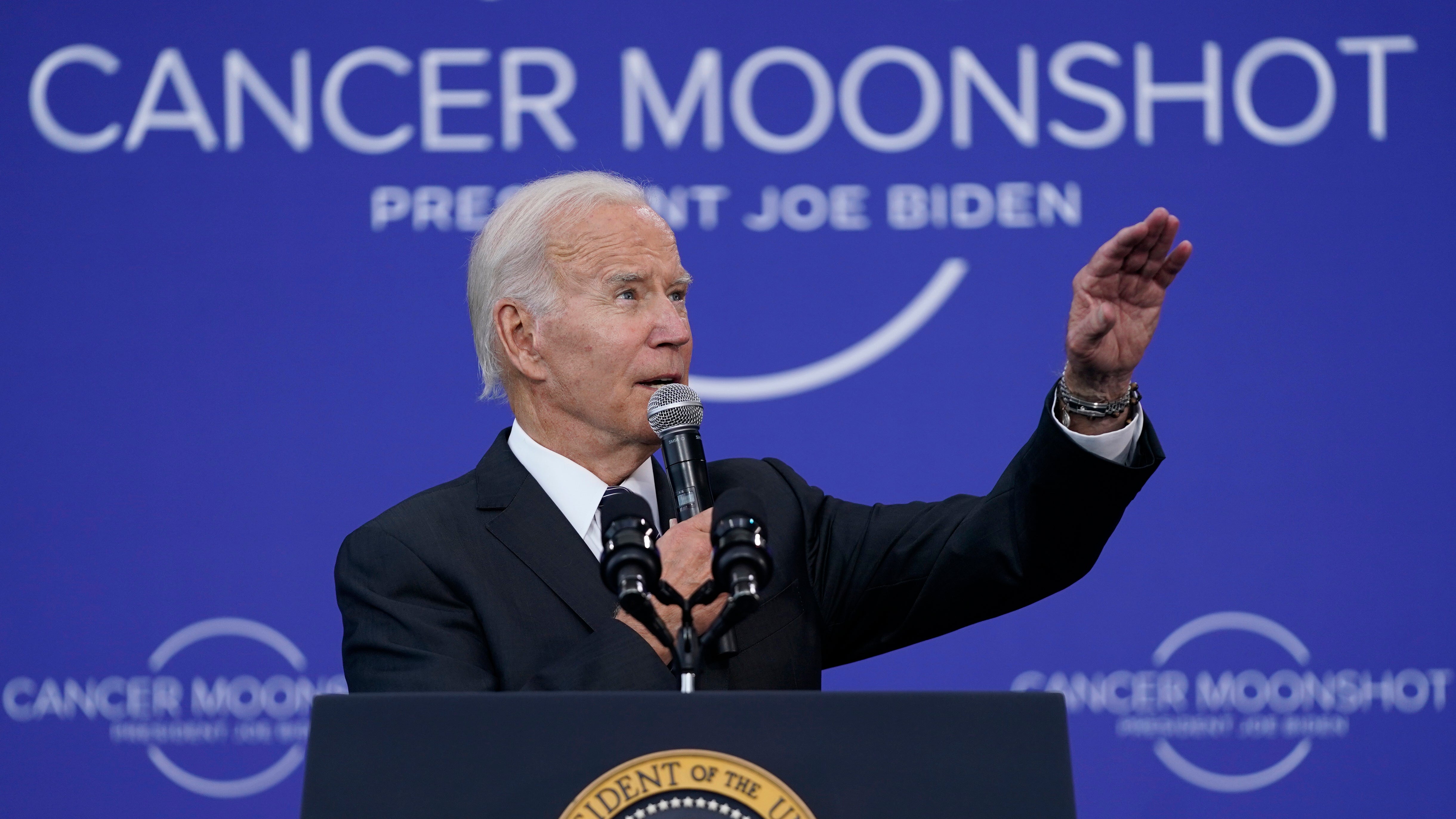Biden evokes JFK call to harness ‘best of our energies’ in space race as he touts progress against cancer
‘I believe we can usher in the same unwillingness to postpone — the same national purpose that will serve to organize and measure the best of our energies and skills to end cancer as we know it, and even cure cancers, once and for all’

President Joe Biden on Monday said his administration’s effort to bring to the fore new treatments and cures for cancer is in a similar position to America’s space programme at the time then-president John Kennedy called for the US to marshal resources to put a man on the Moon and bring him home again.
Speaking at Kennedy’s presidential library on the six-decade anniversary of the day he declared that Americans would “choose to go to the moon” because doing so was hard rather than easy, Mr Biden invoked the 35th president’s legacy as he compared the present moment to the time when Kennedy called on America to reach for the stars.
“America faces the choice to move forward, or to move backwards, to build the future or obsess about the past. To be a nation of unity and hope and optimism, or a nation to division, violence and hatred,” Mr Biden said.
“In choosing to go to the moon, President Kennedy said America was doing so ‘not because it was easy, but because it was hard’ … on the 60th anniversary of his clarion call, we face another inflection point,” Mr Biden said. “I believe we can usher in the same unwillingness to postpone — the same national purpose that will serve to organize and measure the best of our energies and skills to end cancer as we know it, and even cure cancers, once and for all”.
He added that the “cancer moonshot” was one of the reasons he ran for president, and is part of the “unity agenda” he laid out at his State of the Union speech earlier this year.
Though Mr Biden acknowledged “enormous progress” since President Richard Nixon declared a “war on cancer” a half-century ago, he lamented that it is still the second most prolific killer of Americans each year.
“For too many cancer patients and their families, instead of hope there's bewilderment — the feeling of being on your own … as hospital and doctors can’t easily share your medical records with other hospitals and doctors to help find answers even when every minute counts, [and] having to advocate for even the most basic care and attention for your loved ones,” he said, adding later that his administration’s plan would cut cancer deaths in half over the next quarter-century.
Mr Biden also announced that he has chosen a veteran Defense Department research scientist, Dr Renee Wegrzyn, to lead the new Advanced Research Projects Agency for Health, or Arpa-H. The new agency was established in March by executive order and charged with driving innovation in the biomedical field.
The White House said Dr Wegrzyn’s time as Arpa-H director will see the agency “support programs and projects that undertake challenges ranging from the molecular to the societal, with the potential to transform entire areas of medicine and health in order to prevent, detect, and treat some of the most complex diseases such as Alzheimer’s, diabetes, and cancer”.
The issue of advancing America’s fight against cancer is a personal one for Mr Biden, whose eldest son, Joseph R Biden III — better known as Beau Biden — passed away from a brain tumour in 2015.
After the death of his son, Mr Biden championed legislation which appropriated $1.8bn for cancer research over seven years. That bill, which was known as the 21st Century Cures Act, was signed into law by President Obama in 2016.
Mr Obama would tap then-vice president Biden to run what he described as “mission control” — overseeing distribution of the $1.8bn — as a way of channelling his grief over the loss of his son.
In his memoir, Promise Me, Dad, the president wrote that Beau Biden’s death was the primary reason he chose not to throw his hat into the 2016 Democratic presidential primary.
Join our commenting forum
Join thought-provoking conversations, follow other Independent readers and see their replies
Comments
Bookmark popover
Removed from bookmarks